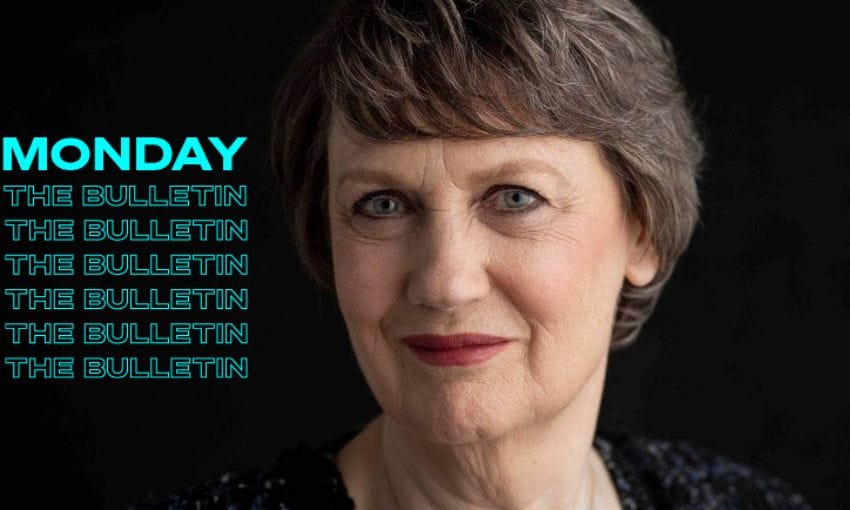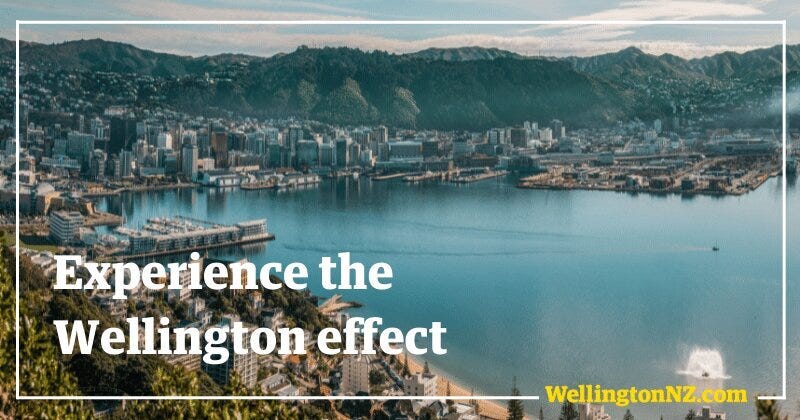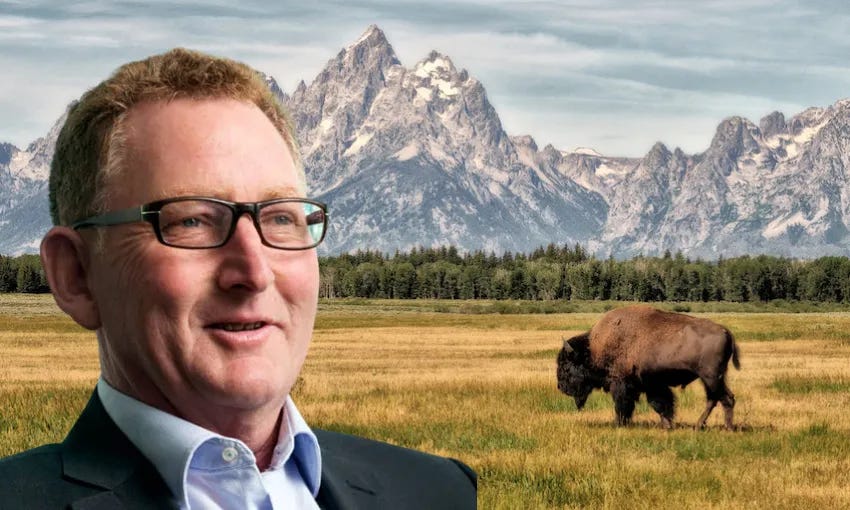The game-changing drug programme still waiting for a national rollout
Northland's Te Ara Oranga methamphetamine harm reduction programme started in 2017. For every dollar spent, $3-$7 in benefits are gained. So where are the plans to roll it out nationally?
Mōrena and welcome to The Bulletin for Monday, September 5, by Anna Rawhiti-Connell. Presented in partnership with Z Energy.
In today’s edition: deadline to book surgeries for those on waiting list passes; government views Auckland Council’s character housing protections as unlawful; prime minister headed to New York; but first, the stalled progress of a successful drug programme.
Former prime minister Helen Clark says the “wars on drugs” has failed (Photo: supplied)
“The war on drugs has failed”
So says former prime minister Helen Clark. Clark’s foundation released a report yesterday calling for a complete rethink in the way we deal with methamphetamine in New Zealand and a proper pivot to a health-based approach. It follows calls from MP Chlöe Swarbrick to do the same and correlates with a June survey that found 68% of New Zealanders support replacing the country's Misuse of Drugs Act with a health-based approach. The report recommends a pilot programme to give methamphetamine users a substitute stimulant – or the drug itself. It also calls, once again, for the national rollout of the highly successful Te Ara Oranga programme, a collaboration between police, health agencies and the community in Northland that’s been described as “game-changing” and has proven to reduce reoffending by 34%.
Minister committed to rolling programme out nationwide in 2021
Health minister Andrew Little committed to rolling the Te Ara Oranga programme out nationwide in November 2021. Since then, we’ve seen it rolled out in the eastern Bay of Plenty (BOP) with services now available in Murupara. Budget 2022 provided $3.5m for further expansion in the area. National party health spokesperson Shane Reti has been a supporter of the programme for a while and said in February that a future National government would expand Te Ara Oranga across the country. Andrew Little told The Detail in March the government is committed to rolling the programme out by the end of this parliamentary term. I’m not entirely sure if that’s a definitive statement on the rollout being national or whether the BOP rollout is the sum total of it.
The programme is comparatively low cost
The Herald’s Jared Savage was seeking answers on the progress of the rollout in February (paywalled). "Significant funding will need to be secured for a full roll-out of the programme," said a spokesperson. That significant funding was later clarified as being $38m. An evaluation of Te Ara Oranga in 2021 put the cost of a national rollout at $40-45m while estimating that for every dollar spent, $3-$7 was gained in benefit. The 2020 Drug Harm Index (DHI) estimated methamphetamine causes $823.5m in social harm. The foundation’s report notes the DHI isn’t a perfect exercise in estimating the cost of drug harm, but no one is arguing that from a relatively small methamphetamine user base (an estimated 9000 people using monthly or more), a disproportionate amount of harm is caused. It’s also likely that the criminal approach we take to methamphetamine use masks the true numbers and impact.
Increase in methamphetamine detected in wastewater
Responding to the release of yesterday’s report, acting minister of health Peeni Henare (Little is out of the country in his capacity as GCSB minister) said the government is already working on a drug reform programme to treat use as a health issue not a criminal one. Henare pointed to the rollout of Te Ara Oranga in the eastern Bay of Plenty. It is worth noting that the programme does require a real mindset shift, specialist training for those involved and buy-in from the community. That all takes time but an interim evaluation of the programme gave it the big tick back in 2018. ESR's Andrew Chappell told 1News that there’s been a rise in methamphetamine detected in wastewater based on pre-Covid level so the problem also isn’t getting any smaller as time goes by.
Inspiring success in our capital
There’s a special kind of magic that exists in Wellington. That magic can be found in the communities who come together to support the entrepreneurs, foodies, creatives and business people with big goals, in the sunshine and even in the birds that gather on the streets of the city. The Spinoff spoke to artist Jonathan Campbell and business owners Rachel Taulelei from Oho and James Fuller from Hnry about how Wellington has supported them to succeed… and about pigeons. Read more here (sponsored).
Deadline for surgical bookings for patients waiting at least a year passes
The Dominion Post is leading with a story from Rachel Thomas about surgical waiting lists this morning. You might recall that in July, Te Whatu Ora – Health NZ (HNZ) ordered all 20 districts to book surgical slots for 7475 patients who had been waiting at least a year for surgery by August 31. That deadline has passed and perhaps it will take a few more days to be able to confirm that’s been done, but at the time of the story going to print, HNZ couldn’t confirm whether it has. Sarah Dalton, executive director of the Association of Salaried Medical Specialists, said while the move was a worthwhile aspiration, it was unlikely to be meaningful. “Nothing has changed in the past two months in terms of workforce or building capacity” she said.
Special character housing protections in Auckland viewed as unlawful by government
On August 18, Auckland Council notified three plan changes: one that enacted new housing intensification rules mandated by the government, and two that would place restrictions on development. The Herald understands the government thinks what Auckland Council notified in August is unlawful, “breaching the spirit and the letter” of new planning laws designed to free up urban land for more housing, mainly because of the way the council has applied "special character area" protections liberally in suburbs like Ponsonby and Grey Lynn. Housing minister Megan Woods was critical of the protections being extended to 16,000 houses in July saying the government had a range of options for intervention that may be appropriate to use at a later stage.
The Spinoff Members is a community dedicated to supporting quality, homegrown journalism.
From our newsletters and podcasts, to our coverage of te ao Māori and political reporting – the support of readers like you makes this work possible and helps to ensure it remains freely available to all. If you can, please consider making a contribution today.
Prime minister New York bound
Prime minister Jacinda Ardern will travel to New York on September 17 to represent New Zealand at the United Nations General Assembly. It’s an annual meeting of world leaders which Ardern would usually attend but has not since 2019. Ardern will also co-host a Christchurch Call leader’s summit with French president Emmanuel Macron, and participate in events to promote trade, investment, and tourism, including the promotion of New Zealand as a film-making destination. The prime minister will fly Air New Zealand on the airline's first direct flight to New York.
Click and collect
Announcement expected today on law change to stop gangs and criminal groups hiding their assets.
Government backing for new revenue streams for councils including road congestion charges and bed taxes.
Waiting list for social housing in Christchurch has quadrupled in the past five years.
Experts weigh-in on possible changes to mask mandates (paywalled).
More than a billion dollars needed to fix Lower Hutt's water infrastructure.
Got some feedback about The Bulletin, or anything in the news? Get in touch with me at thebulletin@thespinoff.co.nz.
If you liked what you read today, share The Bulletin with friends, family and colleagues.
Bernard Hickey talks to Reserve Bank governor Adrian Orr about the mood at the “support group for central bankers” otherwise known as the Jackson Hole economic conference; Toby Manhire explains how to learn about your local election candidates and the red flags to look out for; Sam Brooks talks to queer community stalwarts for an oral history of the Hero Parade; Tara Ward watches the final ever episode of Neighbours and tries not to cry; and a solo Chris Schulz joins a cruise in Fiji.
How Liz Truss went from chaotic to favourite for prime minister
Later tonight we will know the results of the Conservative party’s leadership contest and who the next prime minister of the United Kingdom will be. The results are expected to be announced Monday, 12.30pm (UK time). It’s expected that Liz Truss will win so here’s a rundown from The Observer on how Truss went from an “amateurish and chaotic” campaign launch to probable prime minister and what that result bodes for the future.










